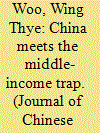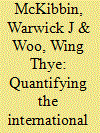| Srl | Item |
| 1 |
ID:
116496


|
|
|
|
|
| Publication |
2012.
|
| Summary/Abstract |
We follow Woo (2011) in using the Catch-Up Index (CUI) to define the middle-income trap and identify the countries caught in it. The CUI shows that China became a middle-income country in 2007-2008. We see five major types of middle-income trap to which China is vulnerable: (a) fiscal stress from the nonperforming loans generated by the interaction between the lending practices of the state banks and the innate desire by state enterprise managers to over-invest and embezzle; (b) the frequent use of macro-stabilization tools that hurt long-term productivity growth; (c) flaws in socio-political governance that exacerbate social tensions; (d) ineffective management of environmental challenges that threaten sustainable development; and (e) inept handling of international economic tensions that could unleash trade conflict. We recommend new governance principles and management methods to prevent China from falling into these five types of middle-income trap.
|
|
|
|
|
|
|
|
|
|
|
|
|
|
|
|
| 2 |
ID:
102882


|
|
|
|
|
| Publication |
Canberra, ANU Press, 2009.
|
| Description |
xviii, 461p.
|
| Standard Number |
9781921536960
|
|
|
|
|
|
|
|
|
|
|
|
Copies: C:2/I:0,R:0,Q:0
Circulation
| Accession# | Call# | Current Location | Status | Policy | Location |
| 055824 | 338.951/GAR 055824 | Main | On Shelf | General | |
| 055926 | 338.951/GAR 055926 | Main | On Shelf | General | |
|
|
|
|
| 3 |
ID:
051869


|
|
|
|
|
| Publication |
Nov-Dec 2003.
|
|
|
|
|
|
|
|
|
|
|
|
|
|
|
|
| 4 |
ID:
051517


|
|
|
|
|
| Publication |
Mar-Apr 2004.
|
|
|
|
|
|
|
|
|
|
|
|
|
|
|
|
| 5 |
ID:
071213


|
|
|
|
|
| Publication |
2006.
|
| Summary/Abstract |
China has a built-in inflationary tendency because of the partially-reformed nature of its economic system. Specifically, the post-1978 marketization of the economy has interacted with the continued state ownership to create an inflationary 'liquidity tango' between the state-owned enterprises (SOEs) and the state-owned banks. Whenever the hard budget constraint is imposed on the SOEs, China's dysfunctional financial system would impart a deflationary bias to the economy and render China a capital exporting country by constraining the growth of aggregate demand to be less than the growth of aggregate supply. The use of price mechanisms as the only instruments for all economic problems is not appropriate for China's transitional economy, e.g. trade surpluses are better handled by the establishment of an efficient financial intermediation mechanism than by appreciation of the Yuan.
|
|
|
|
|
|
|
|
|
|
|
|
|
|
|
|
| 6 |
ID:
088464


|
|
|
|
|
| Publication |
2009.
|
| Summary/Abstract |
The 30 years of reform and opening have brought great material progress to China. By becoming a big country, China's actions created huge spillovers on other countries. The result has been a rise in trade tension between China and its trade partners. Recently, some have claimed that China's prolonged large trade surpluses have undermined global financial stability and tilted the world into a deep recession, if not a 1930s-style depression. Others have claimed that the greenhouse gases from China's industrialization would soon cause cataclysmic global climate change. One blunt but effective way to eliminate these negative spillovers is to restrict imports from China. Labor in the rich countries is under considerable stress because of the deep global structural adjustments brought by: (1) the integration of the labor force of China, India and the Soviet bloc into the world economy; and (2) the acceleration of technological innovations (as exemplified by the revolution in information technology). The new global equilibrium could be a win-win outcome for the world but the process of moving to it is a painful one. Protectionism to avoid the transitional pains is, however, likely to end up in a lose-lose outcome for the world. China must therefore, in its own interests, help to reduce international tension by updating its strategy of international economic engagement. China has to go beyond being a passive beneficiary of the WTO system to being an active promoter of WTO objectives. China should work with the US to bring Doha Rounds negotiations to a successful conclusion. China must also play a stronger and more constructive role in the forthcoming international talks on global climate change. China and India are simply too big to be exempted for a long time from national ceilings on the emission of greenhouse gases. China will have to face down its internal political opposition to replace the backward state-controlled financial system with a dynamic, but well-regulated, diversified private financial system in order to eliminate the odd phenomenon of a poor country lending to a rich country. For its neighborhood, China should push for an Asian Economic Union that takes the form of a WTO-plus free trade and open investment area that has regional pooling of foreign exchange reserves. Since there is no prospect of free labor mobility within East Asia, monetary integration would produce an economically inefficient outcome. East Asia should therefore be focusing its energy on creating as large a free trade area as possible, and forgo the unrealistic goal of a common Asian currency.
|
|
|
|
|
|
|
|
|
|
|
|
|
|
|
|